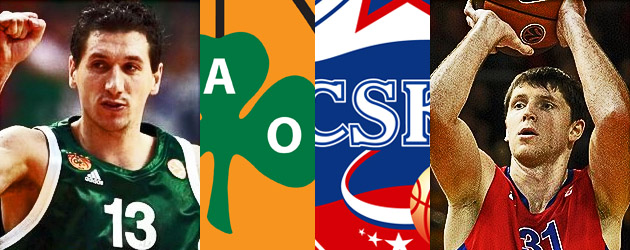By George Rowland, of in-the-game.org / @georgerowland
We reached out to savviest Euro hoops-sayer in the West of England for his take on this battle between two perennial Final Four participants
In what might be the most intriguing matchup of the play offs CSKA will take on Panathinaikos with some key injuries on both sides potentially playing a part in the series.
The obvious absence for the beginning of the series is Milos Teodosic, who is slated to miss at least the first two games of the series. Teodosic came into the season having had major surgery on his calf, and it is the same right calf yet again bothering him. It is likely that we will see Aaron Jackson starting in his stead, Jackson has been arguably one of CSKA’s best players this season both offensively and defensively. With Jackson on court, CSKA are better in many of the major advanced statistical measures, most tellingly is their effective field goal percentage, which rises by 7 percentage points and turnover percentage which drops by almost 3 percentage points. This reflects in the total offensive rating, which jumps from 108.8 with Jackson off court to 126.3 with Jackson on court.
However on the downside Teodosic’s absence means that Jeremy Pargo’s role will have to be expanded. Pargo was brought in to be a major role player given that Teodosic was coming off surgery, and that Jackson had looked like the odd man out coming into the season. In reality Pargo has been the least effective of the point guard troika, as he has been turnover prone and over-reliant on unassisted mid-range jump shots.
CSKA’s combination of size and shooting is likely to stretch PAO’s normally elite defence. Given their tendency to switch a lot after on ball screens CSKA will probably look to attack PAO using post ups, especially with Kaun and Krstic. This leaves a catch 22, do Panathinaikos allow CSKA to isolate their bigs on a smaller guard or wing, or do they bring help from CSKA’s great shooters (Fridzon, Micov, Vorontsevich, Khryapa) at the wing positions? A potential counter for PAO might be to line up as many on their big, long, athletic players (Diamantidis, Bramos, Maciulis, Gist & Lasme) in one line up. This line up has only played four minutes together in a game against Barcelona (who can also boast a big line up like CSKA) but forced four turnovers in that period, and conceded 0 points.
As Rod Higgins mentioned in his recent piece on in-the-game.org, CSKA do suffer from poor spacing at times, especially when they play their dual centre line-ups, with two of Nenad Krstic, Sasha Kaun and Kyle Hines on court at one time. While these line-ups have been successful in particular match ups (the fourth quarter of the first CSKA-Real game being one of them) as Rod noted CSKA lineups with Hines at centre are 4 points per 100 possessions better offensively than the team average, in comparison to line ups with Hines at power forward which are 3 points per 100 possessions worse than the team average.
Panathinaikos have yet again built their team on defence, boasting the best defensive rating in the top 16 at 100.4, yet their offence was among the worst, at a 100.2 rating, with their lack of shooting from their guards and big men stifling their spacing. With Zack Wright still resolutely refusing to shoot a three other than when absolutely necessary CSKA could implement the strategy that Panathinaikos used against Barcelona and Victor Sada last playoffs by aggressively helping off him. With CSKA boasting some lengthy defensive players combined with PAO’s lack of shooting shrinking the court, CSKA could force many live ball turnovers, where they have been very efficient this season, with an effective field goal percentage of 71.4%.
The decisive player in this match up for Panathinaikos is likely to be Stephane Lasme. The Gabonese centre, last year’s defensive player of the year, has been hampered by illness recently and only logged 9 minutes against Olympiacos, but will be key against a big CSKA frontline. Although Lasme gives up almost 10 centimetres to both Sasha Kaun and Nenad Krstic his length and athleticism will afford him the ability to disrupt any entry passes CSKA attempt in the same way Marcus Slaughter did against CSKA in Madrid. Panathinaikos’ centre rotation beyond Lasme could be an issue, however. Mike Batiste is a shadow of his former self, and James Gist, while long and athletic lacks some of Lasme’s strength and also remains a very undisciplined defensive player at times.
It is tough to see anything other than a CSKA victory in this series, Panathinaikos will probably try to slow the game down but with CSKA also looking to play at a slow pace this will be unlikely. Though if this series does turn into a low pace defensive contest it could come down to each team’s ability to score in isolation. In which case we should see the performance of Sonny Weems as key to direction of the tie. Weems has been fantastic at creating his own shot recently, as his ability to score in isolation led them to a closely run overtime victory against Galatasary and was also a major contributing factor to their victory against Maccabi in Tel Aviv. On the other end the pressure will be on Dimitris Diamantidis, he is being relied on more than ever to create not only shots for other, but shots for himself, as fewer than 40% of his field goals have been assisted, will CSKA be able to force him into the costly turnovers that have plagued him at the end of some games?
Despite this the question on everyone’s lips is will Panathinaikos’ tactic of resting Shang Ping for the season to keep him fresh for the playoffs pay dividends? Only time will tell…
 Posts
Posts
